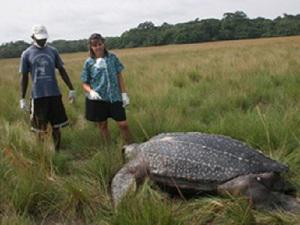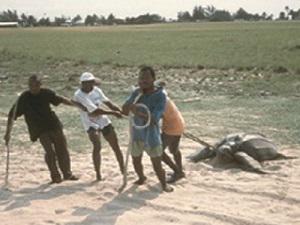Guy-Philippe Sounguet
This project aims to carry out effective protection of the nesting beaches against man-made threats and to control the flow of tourists that come to observe the turtles during the laying season.

Turtle in savana.
In general, the marine turtles are disappearing step by step and their number is greatly reduced. Since 1996, ASF (in English Adventures without Borders) has supervised a project to conserve the marine turtles and has demonstrated the importance of Gabon's beaches for the reproduction of the Leatherback Turtle (Dermochelys coriacea). This has also resulted in the creation of Pongara National Park close to Libreville. Each year, there are nearly 800 nests of Leatherback turtle (Dermochelys coriacea) on about 5 km of beach in front of Libreville, the capital of Gabon. Up to 300 visitors use these beaches, every week-end.

Turtle rescue.
The majority of people choose to go either by foot or on quad-bikes without any guide's assistance, to observe the marine turtles. Tourists generate artificial lights and vehicles used on the beach prevent females from emerging to lay eggs, or disturb them and disorientate them after laying. Hatchling turtles are also adversely affected and prevented from reaching the sea in safety. In order to reduce these threats, we wish to set up an education and information service, to monitor the beaches and assist visitors by setting up a guiding service, using guides recruited and trained among the local population.
The aim of the project is to bring an improvement of the behaviour of the public by respecting marine turtles and their habitat. Particularly to respect the turtles and the sand surfaces where they lay their eggs. Marine turtles are highly migratory species, so it makes no sense to protect them elsewhere in their range if they continue to be threatened on our coasts?
Four species of marine turtle nest along the Gabonese coast. The leatherback turtle is partially protected by national legislation whereas the other three species (the Green Turtle Chelonia mydas, The Hawksbill Turtle Eretmochelys imbricata and the Olive Ridley Lepidochelys olivacea) are not protected by law. The results of the proposed project will permit us to enrich our knowledge of Gabon's marine turtles and the conservation requirements of these species.